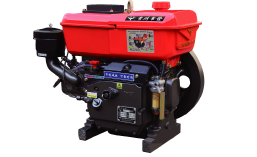Electric motor is a prime mover powered by points, provided that electricity must be available first. Electrical energy becomes mechanical energy. A motor is a passive device for the purpose of generating electricity. It is generally a device that converts mechanical energy such as wind, water, manpower, etc. into electrical energy through changes in coils and magnetic fields. It is used to produce electricity.
Engines generally include internal combustion engines, steam engines, etc. They mainly convert chemical energy in gasoline, diesel and other fuels into mechanical energy.
The application can use the engine to drive the generator to generate electricity, and the electricity to drive the motor to generate mechanical energy. An engine is a machine that can convert other forms of energy into mechanical energy, including internal combustion engines (gasoline engines, etc.), external combustion engines (Stirling engines, steam engines, etc.), electric motors, and so on. Such as internal combustion engines usually convert chemical energy into mechanical energy. The engine is not only applicable to the power generating device, but also refers to the entire machine including the power device (such as: gasoline engine, aviation engine). The engine was first born in England, so the concept of engine also originated from English, and its original meaning refers to the "mechanical device that generates power".
A generator is a mechanical device that converts other forms of energy into electrical energy. It is driven by a water turbine, steam turbine, diesel engine or other power machinery, and converts the energy generated by water flow, air flow, fuel combustion or nuclear fission into mechanical energy and then transmits it to the generator. Converted into electrical energy by a generator. Generators are widely used in industrial and agricultural production, national defense, science and technology and daily life. There are many forms of generators, but their working principles are based on the law of electromagnetic induction and the law of electromagnetic force. Therefore, the general principle of its construction is: use appropriate magnetic and conductive materials to form magnetic circuits and circuits that conduct electromagnetic induction with each other to generate electromagnetic power and achieve the purpose of energy conversion.
- Previous article: What are the components of a hydraulic motor

 中文
中文 English
English Español
Español Français
Français
